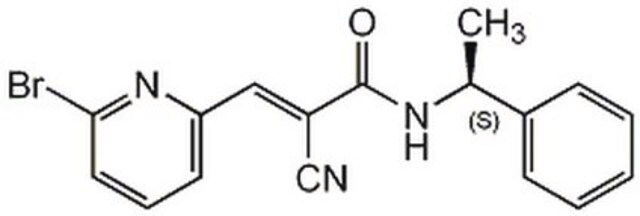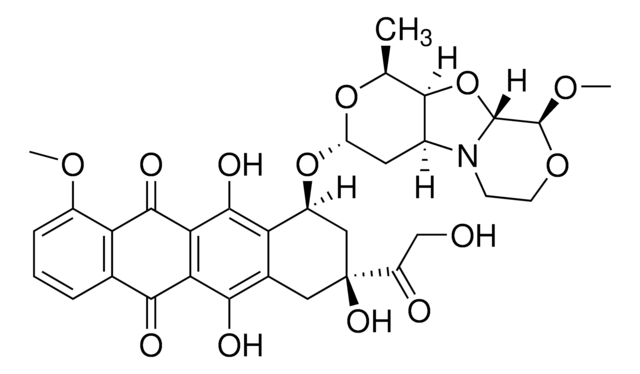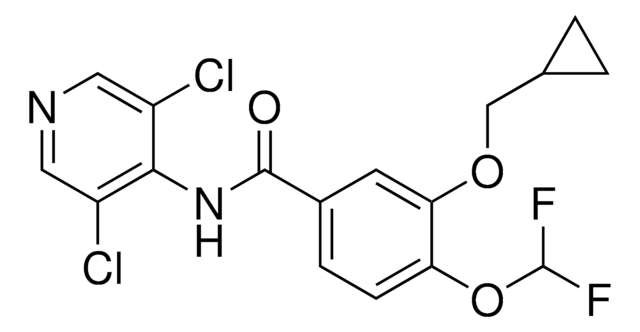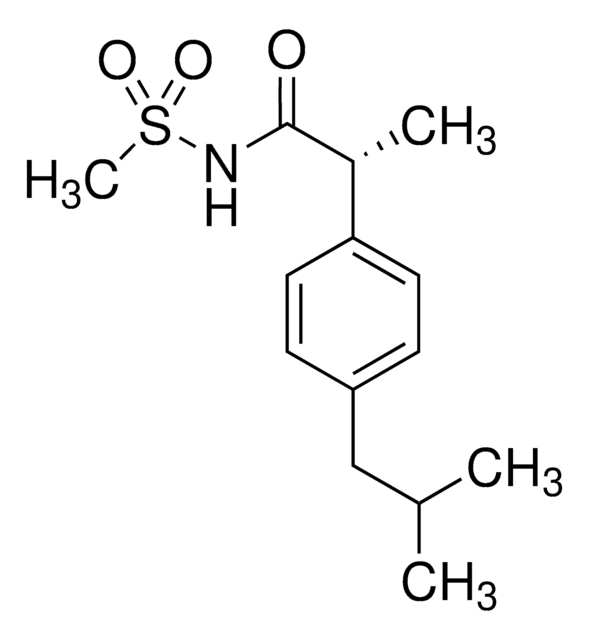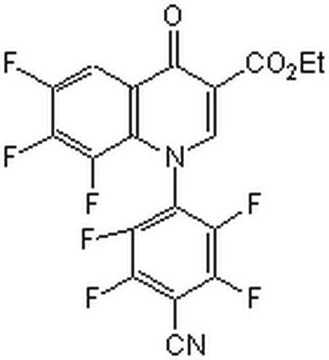5.30750
STAT3 Inhibitor XX, APT STAT3-9R
Synonym(s):
STAT3 Inhibitor XX, APT STAT3-9R, H₂N- HGFQWPG(SWTWENGKWTWK)G AYQFLK-GGGGS-RRRRRRRRR-CO₂H
Sign Into View Organizational & Contract Pricing
All Photos(1)
About This Item
Empirical Formula (Hill Notation):
C223H330N80O51
Molecular Weight:
4947.51
UNSPSC Code:
12352200
NACRES:
NA.77
Recommended Products
Assay
≥95% (HPLC)
Quality Level
form
solid
manufacturer/tradename
Calbiochem®
storage condition
OK to freeze
desiccated (hygroscopic)
protect from light
color
white
solubility
H2O: 50 mg/mL
storage temp.
2-8°C
General description
A cell-permeable STAT3 inhibiting peptide that corresponds to the high affinity STAT3-interacting aptide APTSTAT3 (KD = 231 nM), originally identified by phage peptide library screening, with the addition of 9 arginines at the C-terminus via a GGGGS linker sequence. Reported to inhibit JAK2-catalyzed STAT3 phosphorylation in cell-free kinase assays and suppress cellular STAT3 phosphorylation as well as DNA-binding activity (by 54% post 6 h 30 µM treatment) in human lung carcinoma A549 cultures, resulting in downregulation of cell cycle progression regulator cyclin D1 and reduced expression of anti-apoptic survivin & Bcl-xL, while exhibiting little effect toward cellular phosphorylation levels of STAT1/5 and Akt. Shown to inhibit A549 proliferation (GI50 = 10 to 20 µM in 12 h by MTT assay; complete inhibition by 30 µM in 2-wk colony formation assay) via apoptosis induction (PI+/Annexin V+ population = 15% vs. 2.8% with or without 6 h 30 µM drug treatment) in vitro and intratumoral injection is efficacious in suppressing the growth of established tumors derived from B16F1 murine melanoma allograft as well as from human U87MG glioblastoma and A549 (8 mg/kg, q.o.d.) xenografts in mice in vivo. Binding study indicates that the majority of APTSTAT3 affinity is mediated via STAT2 SH2 domain interaction and only moderate affinity is detected toward DNA-binding domain (DBD).
A cell-permeable, 26-mer peptide (APTSTAT3) that binds to STAT3 with high affinity (Kd = 231 nM) and blocks its DNA binding activity.
A cell-permeable, 26-mer peptide (APTSTAT3) with tryptophan zipper scaffold that forms a robust β-hairpin structure and binds to STAT3 with high affinity (Kd = 231 nM) and blocks its DNA binding activity. Its cell permeability is conferred by fusion of peptide to 9 arginine residues via a GGGGS linker. Selectively targets SH2 domain of STAT3 and disrupts STAT3-JAK2 interaction and STAT3 phosphorylation (Tyr705) and dimerization without affecting STAT1 and STAT5. Shown to effectively reduce mRNA levels of cyclin D1, Bcl-xL, and survivin in A549 cells and suppresses their viability and proliferation (~10-20 µM). Exerts antitumor properties in both xenograft (8 mg/kg, q.o.d., intratumorally) and allograft tumors in BABL/c nude mice and prolongs their survival. Note: Tryptophen zipper sequence in parentheses; STAT3-targeting sequence underlined.
Please note that the molecular weight for this compound is batch-specific due to variable water content.
Please note that the molecular weight for this compound is batch-specific due to variable water content.
Biochem/physiol Actions
Cell permeable: yes
Primary Target
STAT3
STAT3
Warning
Toxicity: Standard Handling (A)
Sequence
H-His-Gly-Phe-Gln-Trp-Pro-Gly-(Ser-Trp-Thr-Trp-Glu-Asn-Gly-Lys-Trp-Thr-Trp-Lys)-Gly-Ala-Tyr-Gln-Phe-Leu-Lys-Gly-Gly-Gly-Gly-Ser-Arg-Arg-Arg-Arg-Arg-Arg-Arg-Arg-Arg-OH
Physical form
Supplied as a trifluoroacetate salt.
Reconstitution
Following reconstitution, aliquot and freeze (-20°C). Stock solutions are stable for up to 6 months at -20°C.
Other Notes
Kim, D., et al. 2014. Cancer Res.74, 2144.
Legal Information
CALBIOCHEM is a registered trademark of Merck KGaA, Darmstadt, Germany
Storage Class Code
11 - Combustible Solids
WGK
WGK 1
Flash Point(F)
Not applicable
Flash Point(C)
Not applicable
Certificates of Analysis (COA)
Search for Certificates of Analysis (COA) by entering the products Lot/Batch Number. Lot and Batch Numbers can be found on a product’s label following the words ‘Lot’ or ‘Batch’.
Already Own This Product?
Find documentation for the products that you have recently purchased in the Document Library.
Daejin Kim et al.
Cancer research, 74(8), 2144-2151 (2014-03-01)
STAT3 promotes the survival, proliferation, metastasis, immune escape, and drug resistance of cancer cells, making its targeting an appealing prospect. However, although multiple inhibitors of STAT3 and its regulatory or effector pathway elements have been developed, bioactive agents have been
Our team of scientists has experience in all areas of research including Life Science, Material Science, Chemical Synthesis, Chromatography, Analytical and many others.
Contact Technical Service


